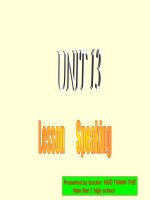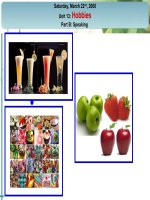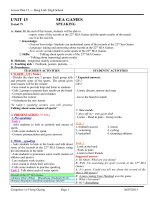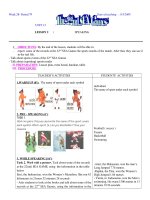unit 13 Speaking soan hay
Bạn đang xem bản rút gọn của tài liệu. Xem và tải ngay bản đầy đủ của tài liệu tại đây (107.38 KB, 3 trang )
Date of preparation:
Date of teaching: Period:
Unit 13: hobbies
Lesson 2: speaking
I. Objectives (based on standard of knowledge skills)
- By the end of the lesson, students will be able to
+ talk about their own hobbies
+ Make a dialogue to ask and answer about a certain hobby
II. Language contents
1. Lexical items: hobby, category, classify……………
2. Structure: the past simple tense, the simple present tense
III. Teaching methods
- The learner- centered approach
- Students’ individual/ pair and group work
IV. Teaching aids:
- Textbook, handouts
V. Procedure:
Teacher’s activities Students’ activities
I. Oral test(5’)
- Call on 4 sts to sit in 2 table
- Read the Vietnamese words and ask sts to write in
English
- Collect and comment and give mark
II. Warm- up(5’)
- Ask sts the questions:
+ Do you often watch TV in your free time?
+ How much time do you spend on it every day?
+ What are your hobbies?
+ Do you spend much money on them?
Lead in: Today we are going to talk more about
hobbies.
III. Speaking
1. Task 1(10’)
Say what would you like to do and why
- Ask sts to read through the names of hobbies and
ask them to work in pairs to ask and answer
- Teacher model and hang the extra board on the
board:
A: Which of the hobbies would you like to do?
B: Swimming. I like it best because I find it
interesting to swim in the swimming pool with my
friend. It’s also good for my health and helps me to
stay fit.
A: And which one wouldn’t you like to do?
B: Fishing. I’m not patient enough.
- Ask 2 students to act out the dialogue
- One student answer the questions
+ yes, I do
+ One or two hours
+ My hobbies are playing chess,
listening to music and watching
TV
- Look at the model in the board
- 2 students read aloud the
example
- Now, ask sts to work in pairs to ask and answers
- If students cannot explain the reason, teacher
should write on the board some useful language:
+ It takes a lot of time
+ It is very dangerous
+ It is fascinating
+ It is interesting
- Call on some pairs to stand up and ask and answer
- Correct their pronunciation and intonation
2. Task 2(10’)
Practice reading the dialogue
- Ask sts to read the dialogue in silence
- Introduce some new words:
+ to classify (v)
+ category(n)
- Ask sts to work in pairs to act out the dialogue
- Go around the class and help sts with difficult
words
- Call on 1 or 2 pairs to read the dialogue
- Correct their pronunciation and intonation
- After sts have finished reading, ask them to pay
attention to the questions in the dialogue and tell
them that they will help them to make a same
dialogue:
1. What's your hobby?
2. Could you tell me how to collect your books?
3. Where do you buy your books?
4. How do you organize your collection?
5. What do you plan to do next?
3. Task 3(14’)
Make a similar dialogue
- Explain the requirement of the task
- Ask sts to skim the words and phrases in this task
- Introduce some new words if sts do not know
* For good sts, ask them to work in pairs to make
the dialogue based on the questions in task 2
* For not good sts, Teacher give them the questions
written on the extra board and hang on:
1. What is the name of the collection?
2. How to collect them?
3. How to organize them?
4. Where do you keep them?
5. Why do you collect stamps?
6. What is your plan for the collection in the future?
- work in pairs to talk about their
hobbies, based on the useful
language on the board
- Read the dialogue in silence
- Work in pairs to act out the
dialogue
- 1 or 2 pairs to read the dialogue
- Listen attentively to the teacher
- Listen to the teacher
- Ask sts to work in pairs to make a dialogue
- Go around to listen and offer help
- Call on some pairs to present in front of the class
- Encourage sts to speak and give mark
Suggested dialogue:
A: What is your hobby?
B: Well, I like collecting Stamps
A: Could you tell me how you collect your stamps?
B: I ask members of family, friend relative postmen
and buy from post office
A: How do you organize your collection?
B: I classify stamp into categories: animals, plants,
birds, landscapes, people such as heroes, singer …
A: Where do you keep stamps?
B: I keep them in album
A: Why do you collect stamps?
B: Because I want to broaden knowledge know
more about landscape, people
A: What do you plan to do next?
B:I want to collect more stamps
IV. Homework( 1’)
- Redo all the task
- Prepare the new lesson
- Using the questions on the board
to make a dialogue about
collecting stamps
- Some pairs talk aloud









